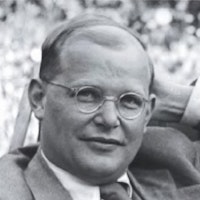In ordinary life we hardly realize that we receive a great deal more than we give, and that it is only with gratitude that life becomes rich.
Dietrich Bonhoeffer

Only with Gratitude
Topic: Gratitude
In ordinary life we hardly realize that we receive a great deal more than we give, and that it is only with gratitude that life becomes rich.
Dietrich Bonhoeffer was born on February 4, 1906, in Breslau, Germany (now Wrocław, Poland), into an intellectually active and musically gifted family. He studied theology at the University of Tübingen and earned his doctorate from the University of Berlin at age 21. Bonhoeffer was ordained as a Lutheran pastor and recognized early for his theological insight and moral clarity. He also spent time teaching and preaching in Germany, Spain, and the United States.
As Hitler rose to power in the early 1930s, Dietrich Bonhoeffer became one of the first to speak out against the regime’s control of the church and its racial ideology. He helped found the Confessing Church, which rejected the Nazification of Christian teaching. In 1935, he opened an underground seminary in Finkenwalde to train pastors committed to spiritual integrity and communal life. His writings from this period, especially The Cost of Discipleship, called the church to live with faithfulness under pressure.
Bonhoeffer’s resistance grew beyond teaching. He aided Jews fleeing persecution and was later linked to efforts to overthrow Hitler. Arrested in 1943, he was imprisoned in Berlin’s Tegel Prison and later moved to Flossenbürg concentration camp. He was executed there on April 9, 1945, just weeks before the war ended. His life remains a clear expression of the cost of conscience and the demands of faithful resistance.
Letters and Papers from Prison
Dietrich Bonhöffer, Letters and Papers from Prison, 1967, p. 370.

Dietrich Bonhoeffer
Theme: Gratefulness

About This Dietrich Boenhoeffer Quotation [Commentary]
Dietrich Bonhoeffer’s reflection—“In ordinary life we hardly realize that we receive a great deal more than we give, and that it is only with gratitude that life becomes rich”—offers a clear reminder that much of what sustains us comes from beyond ourselves. Gratitude, in this sense, is not dependent on comfort or ease but shapes how we see what is already present. Bonhoeffer points to an imbalance we often miss: the quiet abundance we receive daily that far exceeds what we contribute.
The extended passage underscores this shift in perspective: “It is so easy to overestimate the importance of our own achievements compared with what we owe to the help of others.” Bonhoeffer invites us to reflect not just on what we have done, but on what has been done for us—on how deeply our lives are supported by others’ care, presence, and effort. When we become aware of this, life grows rich—not in possessions or accomplishments, but in recognition and relationship.
That Bonhoeffer wrote these words from a prison cell makes their clarity even more compelling. Cut off from freedom and facing execution, he still found himself grateful “for little things”—a bird’s song, the return of spring. His sense of life’s richness was not based on circumstance but on awareness. Gratitude, for him, was not a mood, but a way of seeing, shaped by the truth that we “receive a great deal more than we give.”
Grateful while in Prison
Is it possible to remain grateful and joyful even in the worst of circumstances, such as when your rights are taken away from you, or when you are imprisoned for what you believe in? What if you were condemned to die for a wrong you did not do? Could gratitude still be an option? For Dietrich Bonhoeffer, the answer was a resounding yes. He said, “In ordinary life we hardly realize that we receive a great deal more than we give, and that it is only with gratitude that life becomes rich”.
—“Gratitude.” RaoulWallenberg.net, The International Raoul Wallenberg Foundation website. [Dietrich Bonhoeffer (2011). “Gratitude.” RaoulWallenberg.net, The International Raoul Wallenberg Foundation, www.raoulwallenberg.net.
Letters and Papers from Prison
In 1943, he wrote a letter to his parents, the first of his letters collected in Letters and Papers from Prison: “My dear parents, I do want you to be quite sure that I am all right. To my surprise, the discomforts you usually associate with prison life such as its physical hardships don’t seem to trouble me at all. I can even make a good breakfast each morning of dry bread… I can still hear the hymns we sang this morning. ‘Praise ye the Lord, the Almighty, King of creation. Shelters thee under his wings, yea, so gently sustained.’ How true it is! And may it ever be so… Spring is on its way now with a vengeance. In the prison courtyard there is a thrush that sings a beautiful little song every morning, and now has started in the evening, too. One is grateful for little things, that also is a gain.”
Not too long after he was taken to the concentration camp, Bonhoeffer was implicated in the attempt on Hitler’s life by the resistance group and was condemned for treason. Bonhoeffer’s unbelievable sense of gratitude and cheerful disposition in even the worst situations were remembered fondly by his friends and impressed even his jailers. A British officer who was one of the camp survivors said: “Bonhoeffer was different, his soul really shone in the dark desperation of prison. He always seemed to spread an atmosphere of happiness and joy over the least incident and profound gratitude for the mere fact that he was alive. He was one of the very few persons I have ever met for whom God was real and always near.”
Additional Dietrich Bonhoeffer Quotes
Resources
Related Quotes
Copyright © 2017 – 2026 LuminaryQuotes.com About Us